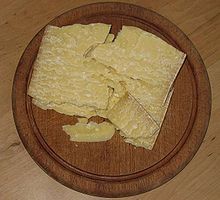Sbrinz
A second explanation is based on the adoption of the Lombard dialect word "sbrinzo", a term for hard cheese.
The Celtic ancestors of the Swiss were making cheese centuries before the birth of Christ.
[3] In the first century AD, Roman writer Columella (or Pliny the Elder) mentions in his writings Caseus Helveticus, which is probably Sbrinz.
The AOC provides specifications for the origin of the milk and the processes that must be followed in order for the cheese to be labeled as Sbrinz.
Sbrinz is commonly consumed in several ways: it can be grated, such as on pasta, or eaten in small pieces, often to accompany wine.

